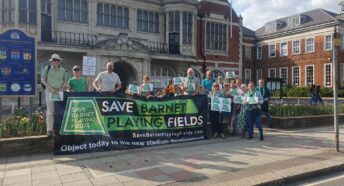'Six long years of dither and delay': the countryside charity reacts as DRS is pushed back to 2024... at best

The much-anticipated deposit return scheme (DRS) is to be delayed until at least 2024, sparking a sharp response from CPRE Kent, the countryside charity.
It was three years ago almost to the day that then-Environment Secretary Michael Gove announced we would all be paying a deposit of up to 22 pence on plastic and glass bottles, as well as on aluminium cans. That deposit could, of course, be reclaimed.
It was suggested the DRS might arrive as early as 2020, although a year later the government said it would be brought in for England, Wales and Northern Ireland in 2023.
However, yesterday (Thursday, March 24), in announcing a second DRS consultation, the government said such a scheme would not be introduced until late 2024, at the earliest. Unsurprisingly, this has not gone down well with the countryside charity, which has campaigned long and hard for a DRS.
Tom Fyans, CPRE campaigns and policy director, said before the announcement was made: “‘Despite huge public appetite to tackle the waste crisis, we have mountains of litter piling up in our countryside.
“New research shows that around eight billion drinks containers are landfilled, littered or burnt every year. Despite all this, the government looks set to delay a deposit return scheme until the end of 2024 – essentially shirking its responsibility and waiting for a new government to show any leadership on the issue. This amounts to six long years of dither and delay.
“This delay is so much more than kicking the can down the road – it seems that in the face of industry lobbying, ministers would prefer to stick their heads in the sand rather than tackle the problem of waste head on.
“The public want to see action, not just warm words. The evidence is clear that an ‘all-in’ deposit return scheme is the best option for people, planet and our economy, yet the government is showing no leadership on the issue at all.
“It beggars belief that when the evidence is so clear that an ‘all-in’ deposit system is needed, it is still unwilling to make the polluter pay.”
Thursday, March 25, 2021
- A number of important documents have yet to emerge. For example, a rigorous transport plan and a finalised air-quality assessment. The latter is critical given that allocations at Teynham will feed extra traffic into AQMAs.
- There seems to be no coherent plan for infrastructure delivery – a key component of the plan given the allocations being proposed near the already crowded Junction 7.
- There seems to have been little or no cooperation with neighbouring boroughs or even parish councils within Swale itself.
The removal of a second consultation might have been understandable if this final version of the plan were similar to that being talked about at the beginning of the consultation process. It is, however, radically different in the following ways:
- There has been a major shift in the balance of housing allocations, away from the west of the borough over to the east, especially around the historic town of Faversham. This is a move that raises many concerns.
- A new large allocation, with accompanying A2 bypass, has appeared around Teynham and Lynsted, to which we are objecting.
- Housing allocations in the AONB around Neames Forstal that were judged “unsuitable” by the council’s own officers have now appeared as part of the housing numbers.
- Most of the housing allocations being proposed are on greenfield sites, many of them on Grade 1 agricultural land – a point to which we are strongly objecting.
Concerns about the rush to submit the plan
The haste with which the plan is being prepared is especially worrying given the concentration of housing in Faversham. If the town is to take a large amount of new housing, it is imperative that the policies concerning the area are carefully worked out to preserve, as far as possible, the unique nature of the town. The rush to submit the plan is likely to prove detrimental.
As Swale does not have a five-year land housing supply, it is open to speculative development proposals, many of which would run counter to the ideas contained in the current plan. Some are already appearing. This is a common situation, and one that, doubtless, is a reason behind Swale’s haste.
Our overriding fear, however, is that this emphasis on haste is ultimately going to prove counterproductive. This is because it is our view that the plan, in its current form, is unlikely to pass independent examination. We are urging Swale to listen to and act upon the comments being made about the plan and to return the plan to the council with appropriate modifications before submitting it to the Secretary of State.
Essentially, this means treating the current consultation not as the final one but as the ‘lost’ second consultation.
The consultation ends on Friday 30 April and we strongly urge residents to make their opinions known if they have not already done so.
Further information








